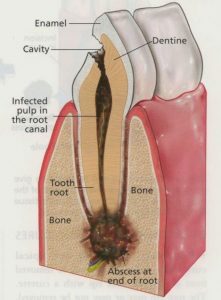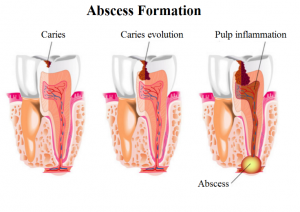Endodontics is a form of dentistry concerned with the treatment of infection at the centre of a tooth (the root canal system). The treatment carried out is commonly known as ‘root canal treatment.
The root canal system contains the dental pulp (the nerve) and extends from the crown (the visible part of the tooth) to the end of the root. A single tooth can have more than one root canal. The pulp is made up of soft tissue that includes nerves and blood vessels. The pulp will begin to die if it’s infected by bacteria. This can happen after:

The bacteria and the harmful substances released will eventually pass out of the root canal through the small hole where the blood vessels and nerves enter, and will travel to the bone and tissues surrounding the roots, causing inflammation (swelling, redness, pain, temperature).
the root canal through the small hole where the blood vessels and nerves enter, and will travel to the bone and tissues surrounding the roots, causing inflammation (swelling, redness, pain, temperature).
This can make your tooth painful and in extreme cases, the inflammation can spread causing your face to become swollen (known as a dental abscess). If the abscess discharges then there will be a minimal pain, but discharge will be evident and may lead to a bad taste in the mouth and bad breath.
Your general dental practitioner may be able to do a root canal. But in some cases if the root canal is more complicated, you may need to see an endodontist. This is a dentist who has spent several additional years studying this specialty after finishing their dental degree – post-graduate training.
The endodontist will carry out the advanced treatment. It is our goal to save your natural teeth wherever possible. However, an endodontist will look at all treatment options to determine the best course of action for your individual case.
Our Endodontists are registered on the General Dental Council (GDC) register as Specialists, or have a special interest in Endodontics (trainee specialists).
To treat the infection in the root canal, the bacteria must be removed. This can be done by either removing the tooth (extraction) or attempting to save the tooth by removing the bacteria and dead/dying pulp tissue from the root canal system (root canal treatment).
After the canal has been cleaned, the root canal is filled and sealed with a filling or crown to prevent the re-entry of bacteria. In most cases, the inflamed tissue at the end of the tooth will heal naturally.
Root canal treatment is usually successful. In about 8 out of 10 cases, a tooth can survive for up to 10 years after root canal treatment.
Root canal treatment can leave the tooth fragile. Evidence shows that placing a crown on top of a root canal treated tooth will protect the tooth from future fracture, increasing the longevity of the tooth, whilst also increasing the success rate of root canal treatment.

